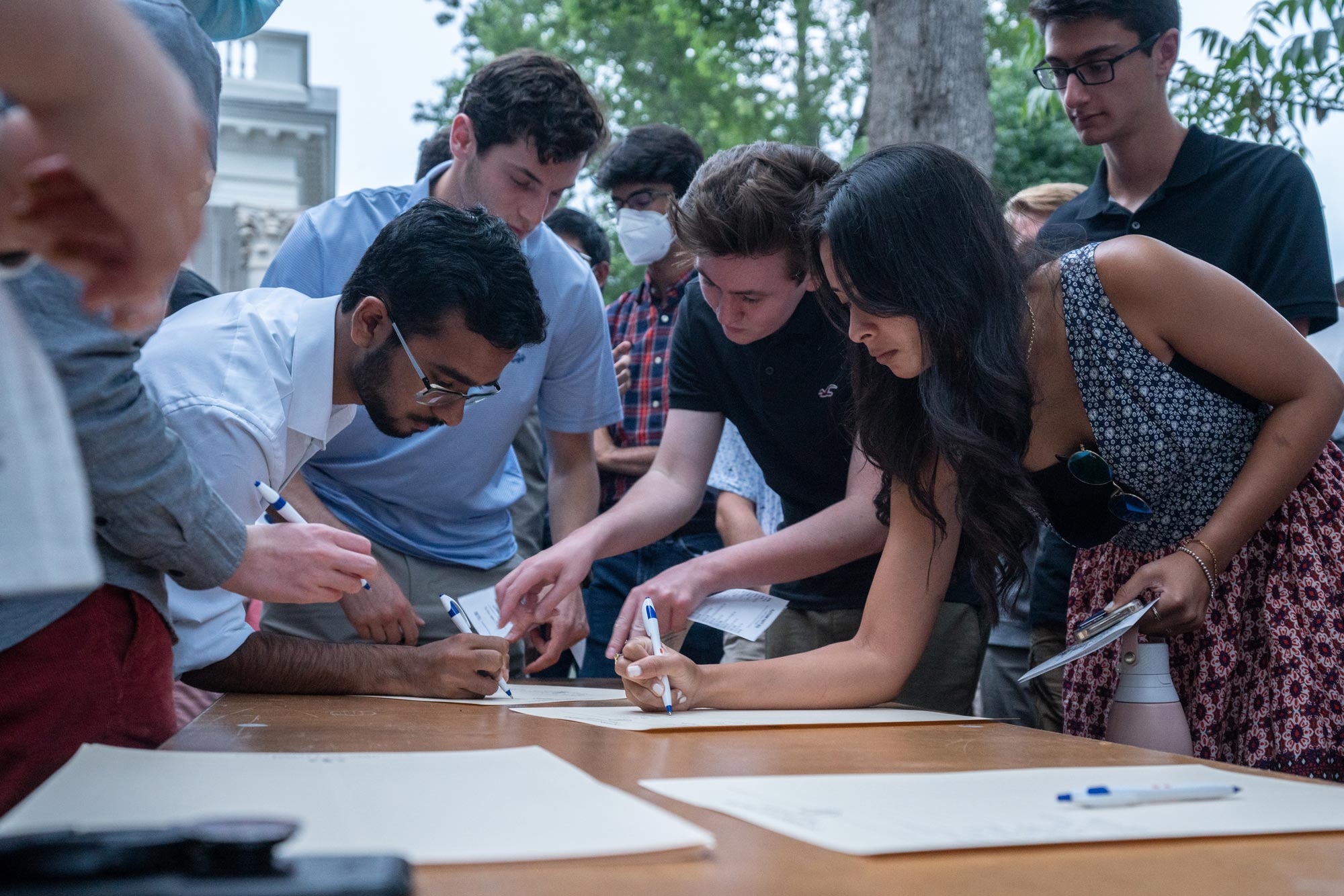Earlier this month, the University of Virginia’s Honor System had perhaps the most significant revision in its history when students voted to amend the system’s single-sanction expulsion penalty for an honor violation, replacing it with a two-semester suspension.
On Wednesday afternoon, President Jim Ryan took part in a virtual discussion with past and present chairs of the Honor Committee to talk about that change and the future of honor at UVA, part of an ongoing effort to help students learn more about the Honor System and its importance to the University.
“I know from many conversations with alumni that the Honor System was – and remains – one of the defining features of their time here, and it has continued to shape their lives since leaving Grounds,” said Ryan at the outset of a 45-minute event that was hosted by the UVA Alumni Association.
“I also know from many conversations with students that the Honor Code remains important to them. Regardless of their views of the Honor System, including the sanctions, students I have spoken to – and I have spoken to many – respect the Honor Code and appreciate what it means to live in a community of trust.”
UVA’s Honor System traces its roots to 1842, and relies on a simple pledge students take to not lie, cheat or steal. The system is completely student-run, with elected student representatives comprising the Honor Committee, and students serving as officers investigating and administrating cases, as well as serving as jurors during honor trials.
While reiterating remarks he made at the recent Board of Visitors meeting in which he said that, if he were a student, he would have voted against the change, Ryan said his only disappointment was that only about 25% of the student body voted.

Past and present chairs of the University’s Honor Committee took part in a virtual discussion hosted by the UVA Alumni Association.
“The Honor System is run by and for our students, and they have the right to change it,” Ryan said. “The fact that they did may be worrisome to some, but accepting student self-governance means accepting that students will make some decisions that their elders would not have made.”
Overall, Ryan said he expects the change to “reinvigorate” the Honor System.
“The heart of the Honor System is not the sanction but the Honor Code,” Ryan said. “And the Honor System works best – and becomes a way of life – when students internalize the Honor Code. Sanctions incentivize students to pay attention to the Honor Code, but I believe during their time here students can and do learn to appreciate what it means to live in a community of trust, and they come to see the value of living their lives honorably.”
In results that were announced March 5, about 80% of the 6,000 students who voted on the Honor System proposal were in favor of the change.
Andy Chambers, the current Honor chair, opposed the amendment because he believed more comprehensive reform was required.
“The Honor Committee, and this is no foreign topic to most chairs, has its own set of issues and we’re always trying to sort them and get better,” Chambers said. “I think this, in its best day, ignores all those issues, and did nothing. And on an average, or a worse day, it would be a net harm to the system.”
Donna Byrd said the reform needs to go further pertaining to the students who have committed honor violations.
“If there is going to be a change to the system, there needs to be something in place where the students have to acknowledge that they’ve done something wrong before they’re admitted back into the community,” said Byrd, who was chair during the 1991-92 academic year and who is now founder and CEO of digital startup bluebutterfly.com. “There needs to be some type of conversation, some type of acknowledgment that they’ve done something wrong and that they’re planning to be better or do better as they reenter the community.”
Alumnus Richard Gard, who served as the event’s moderator, pointed out that at least some type of action was finally taken.
“We’ve spent 50 years sort of dickering back and forth over reforms and nothing ever passed,” said Gard, the Alumni Association’s vice president of communications and the editor of Virginia Magazine. “This time, in a really dramatic way, something did. So maybe that will spur the further reforms that the sponsors envision, and also encourage.”
Thomas Hall said when he was a student, he was something of an “absolutist” when it came to the single sanction, which he believed set UVA apart from other universities.
However, Hall – who served as Honor chair from 2000-2002 and is now vice president and senior associate general counsel at Capital One – said his views have softened over the years.
“I think a core concept regarding the single sanction and student self-governance is that it’s important that the student body have the opportunity to vote on the single sanction every three or four years,” Hall said.
“During my seven years at the University, I think there were at least two votes on the single sanction, and I think that is important from a buy-in perspective to make sure that the then-current students have had a say.”
Toward the end of the discussion, the participants discussed the impact that the Honor System has had on their lives.
“It remains a core of who I am, and how I choose to live life,” Byrd said. “And I do believe that the focus in those four years on the system and the ideals of the system made a difference in who I grew to be during that time at the University, and ultimately who I’ve continued to grow [to] be as an adult since leaving.”
Lillie Lyon, the Honor chair during the 2019-20 academic year who is now a strategic communication associate at SKDK, echoed Byrd’s sentiment.
“I like to say that the No. 1 thing I learned at UVA was the importance of integrity, and it’s a large part of all the decisions that I make on a daily basis, a large part of why I’m in the job that I’m in now where I’m working with advocacy organizations to push for policy change, because I wanted my career to reflect my values.
“The first question I ask myself when anything comes up is, ‘What’s the right thing to do?’ and everything follows from that. And that’s something that is absolutely critical to UVA education. I think that’s something that’s really special and unique about UVA.”
Hall said the Honor System engenders an “automatic trust” in students that extends well beyond their time on Grounds. He said when he used to be a prosecutor with the Department of Justice, he realized just how important the values it instilled were.
“I always described the crimes that I was prosecuting as essentially apolitical because nobody wants people stealing money from grandmas in Ponzi schemes or cheating people out of money through mortgage fraud schemes or whatever,” Hall said.
“I think [prosecuting] just emphasized the universality of the value of the Honor System in our society at-large.”
Jimmy Fang, who was Honor chair in the 1994-95 academic year, said it is because of the Honor System that he feels an instant connection with anybody from UVA he ever meets.
“It is that community of people who have a shared value,” said Fang, now managing partner at C&F Enterprises, a textile manufacturing company.
“Those shared values may evolve somewhat or have changes over time as to what the standards are regarding the system, but there is that baseline of something we agree on. So when I meet somebody else from UVA, you’re starting off from a point that is more significant than some random other person.”
Media Contact
Article Information
March 16, 2022
/content/importance-honor-heart-alumni-association-panel-discussion

